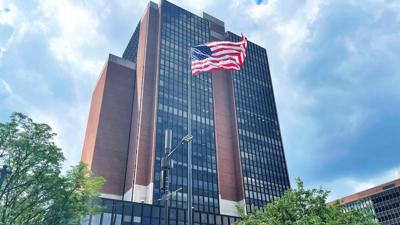
James A. Byrne U.S. Courthouse in Philadelphia
PHILADELPHIA – The City of Philadelphia has agreed to pay $175,000 to settle a lawsuit alleging a drug-addicted man died while being held in a prison cell.
Attorneys at Weir LLP filed a petition to approve the settlement last week in Philadelphia federal court and would take more than $72,000 of the amount in fees and expenses. They had filed suit in February 2024 on behalf of Sherri Pomroy, executor of the Estate of John Butler.
Butler was involved in a 2021 car accident when Philadelphia police officers realized there was an arrest warrant on him for not appearing in court in a drug-possession case. His wife, Pomroy, told officers he was addicted to drugs.
The lawsuit says Detective Michael Fahy and others ignored obvious signs of health issues, like vomit in his cell. Fahy was named as a defendant, but Judge Mary Kay Costello last year dismissed claims against him.
“Decedent had a severe and serial controlled substance dependency and there is no direct evidence of conscious pain and suffering associated with his death,” the petition says.
“Accordingly, the amount of the settlement attributed to the survival action is considerably less than that attributed to the wrongful death action as the settlement amount was largely based upon the loss suffered by the Decedent’s widow and sons.”
Butler was booked on Oct. 27, 2021. Two days later, Fahy went to his cell to prepare a report that included Butler signing a transfer-of-custody waiver. Butler said he’d sign anything that “would make him get out of there faster,” the suit says.
“His body had been shutting down from the drugs already in his system at the time of his arrest 36 hours earlier,” the suit says.
Vomit and a “smashed-up” sandwich were in his cell, as were several bottles of water. Butler claimed the vomit and sandwich were not from him, but he had been the only person in the cell for two days, the suit says.
A few hours after Fahy’s visit, Butler died on Oct. 29, 2021. It is alleged a guard on duty didn’t check his cell for the first four hours of his shift that day, while that guard said he did check after two-and-a-half hours and that Butler was alert and in good health.
The cause of death was methamphetamine intoxication.
“(G)iven that there was no paraphernalia in Mr. Butler’s cell and he was searched before his admission to the DBC, it is reasonable to infer that Mr. Butler died of a methamphetamine overdose he was suffering from at the time of his arrest until his death two days later,” the suit says.







